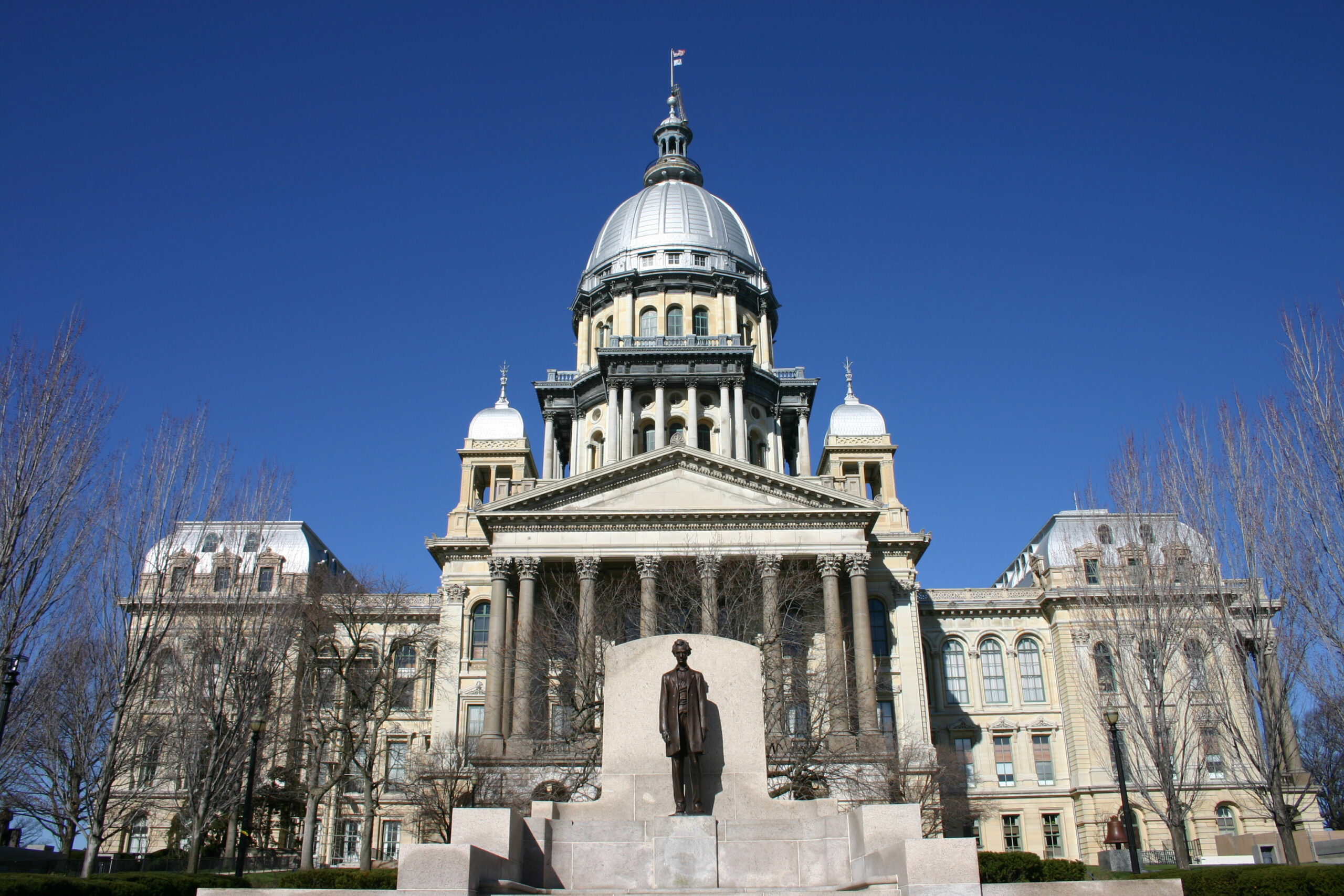The Illinois General Assembly remains at ease until the scheduled return of the House and Senate on March 2. In the interim, both chambers are holding remote legislative committee hearings in preparation for an in-person return to business.
Democratic Governor J.B. Pritzker delivered his third combined State of the State and Budget Address virtually to the Illinois General Assembly on Wednesday, February 17. The Governor outlined a proposed Fiscal Year (FY) 2022 budget that allocates $41.6 billion in General Revenue Funds spending ($95.5 billion in all funds), which represents a $1.8 billion reduction over the previous FY. The FY22 budget does not rely on future federal assistance and does not increase the state’s income tax. Operational spending remains flat over FY21. The budget includes a hiring freeze, $400 million in additional cuts, and reserves a $120 million surplus. Gov. Pritzker is proposing closing $932 million in what he characterized as “unaffordable corporate loopholes.”
Specific to health care, Medicaid spending is held flat and assumes over 3.2 million Illinoisans will be beneficiaries of the Illinois Medicaid program in 2021. Additionally, the governor’s proposed budget includes:
- Department of Healthcare and Family Services (HFS): $29.3 billion in total for Illinois Medicaid, including a little less than $7.4 billion in the General Fund. Of note, the governor’s proposed budget assumes the 6.2% federal FMAP remains in place through CY 2021.
- Department of Human Services (DHS): $8.4 billion in total funding, including $7.4 billion in general funds.
- Department of Public Health (DPH): $1.77 billion in overall appropriations. Maintains $1 billion in federal funding for the COVID-19 response at the department and for local health departments.
For further details about the governor’s proposed budget, please click here to read a budget proposal summary by the Illinois Health and Hospital Association.
The Illinois House and Senate, which are the appropriating branches of state government, will begin to craft and design a FY22 state budget, using the Governor’s proposal as a basis for negotiations. The state budget will be passed prior to May 31, with an effective date of July 1.
102nd General Assembly Key Legislation
Prejudgment Interest in Civil Cases – House Bill 3360 (101st General Assembly)
As shared in last month’s Illinois Update, this legislation was recently passed in the early-morning hours of the lame duck session and would apply prejudgment interest beginning at the notice to the defendant of injury to all actions brought to recover damages for personal injuries or wrongful death cases.
The bill has been sent to the Governor for either signature or veto, and UnityPoint Health has been working in conjunction with the Illinois Health and Hospital Association, fellow hospitals and community stakeholders to request a veto of this harmful legislation which will further burden hospitals and communities during a global pandemic.
To learn more about the potential impact of this legislation, please click here to read a recent joint op-ed in the Quad-City Times from UnityPoint Health – Quad Cities president and CEO, Bob Erickson, and Genesis Health System president and CEO, Doug Cropper.
Telehealth Parity – House Bill 3498
Representative Deb Conroy (D-Villa Park) filed legislation that seeks to create coverage and payment parity for telehealth services, with in-person services, throughout Illinois. The bill should require telehealth to be reimbursed at the same rate as in-person care.
UnityPoint Health has joined The Coalition to Protect Telehealth, a diverse group of Illinois healthcare providers, professionals and patient advocates, to pursue passage of the legislation to protect innovative telehealth approaches, so Illinoisans can continue to safely access critically needed quality, affordable care beyond the COVID-19 pandemic.
Telehealth is a proven model to reduce barriers that exacerbate healthcare disparities such as transportation, lost income, missed work and school, or the stigma of seeking help are greatly reduced or eliminated when telehealth is used. The UnityPoint Health Government & External Affairs team is working with coalition partners advance legislation in the upcoming spring legislative session.
Nurse Licensure Compact – House Bill 580
Representative Mike Zalewski (D-Chicago) reintroduced legislation authorizing Illinois to enter into interstate nurse compact agreements, allowing nurses licensed in surrounding states to be able to work in Illinois and vice-versa. UnityPoint Health supports this legislation.
The legislation was introduced in previous General Assemblies, supported by the Illinois Health and Hospital Association and the American Nurses Association, and opposed by the AFL-CIO at the behest of Illinois Nurses Association. However, via Executive Order by Governor Pritzker, the interstate compact has been allowed during the COVID-19 pandemic and has been shown to be highly effective in responding to patient needs, especially during the pandemic, which may help further make the case for passage of this important legislation.
Nurse Staffing Ratios – House Bill 3871
Representative Fred Crespo (D-Hoffman Estates) reintroduced legislation that would require mandatory nurse-staffing ratios in hospitals and create large daily penalties for hospitals who failed to satisfy the ratios. The proposed legislation would result in service reductions and would prove very costly to the entire hospital industry. The Illinois Health and Hospital Association and UnityPoint Health do not support the legislation as introduced.
For more information on State of Illinois advocacy, legislative, policy and regulatory issues of impact to UnityPoint Health, please contact Ashley Thompson, director of government & external affairs for UnityPoint Health.


